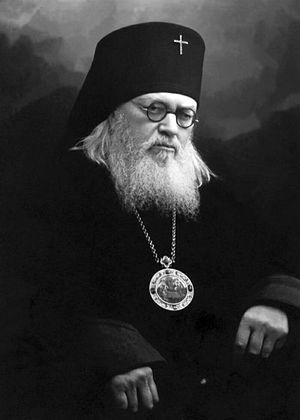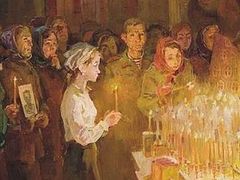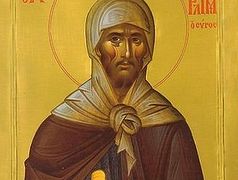 St. Luke Voino-Yasenestky (1877–1961), Archbishop of Simferopol and Crimea, was a great saint of our own times. A surgeon and medical scholar by profession, he became a bishop during fierce persecutions against the Church, knowing that his path would lead to prison and exile. His numerous works are preserved for us and inspire us in the spiritual life.
St. Luke Voino-Yasenestky (1877–1961), Archbishop of Simferopol and Crimea, was a great saint of our own times. A surgeon and medical scholar by profession, he became a bishop during fierce persecutions against the Church, knowing that his path would lead to prison and exile. His numerous works are preserved for us and inspire us in the spiritual life.
OrthoChristian.com will be posting an English translation of his explanation of the Prayer of St. Ephraim the Syrian in parts, so that during these early days of Great Lent we might discover new meaning and inspiration for our Lenten struggle in this prayer, repeated many times at every service.
O Lord and Master of my life! The spirit of idleness, despondency, ambition, and vain thoughts give me not! But rather a spirit of chastity, humble-mindedness, patience, and love bestow upon me Thy servant. Yea, O Lord King, grant me to see my failings and not condemn my brother, for Thou art holy unto the ages of ages. Amen!
The prayer of St. Ephraim the Syrian occupies a special place in the services of the holy Church. It is repeated many times during the services of Great Lent.
This prayer penetrates the heart like none other, mysteriously acts upon it, and you feel a special, exceptional divine power in it. Why is that so? Because it was poured from a heart that was perfectly purified and holy, and from a mind that was enlightened by divine grace and had become a participant in the mind of Christ. It is short, but it nevertheless contains an enormous wealth of thoughts and feelings. Extraordinarily important is the very fact that St. Ephraim asks God to deliver him from everything unholy and repugnant to Him, and to vouchsafe him great virtues. Why does he ask for this?
There are people—and there were especially many during pagan times—who rely entirely upon themselves and think that everything is achievable through the powers of their minds and feelings. They do not understand that many things, in fact the most important, precious and cherished things, are not accessible to our minds and feelings. Whoever understands this understands what the apostle Paul said: For that which I do I allow not: for what I would, that do I not; but what I hate, that do I (Rom. 7:15).
Thus spoke the greatest and chief apostle, recognizing his powerlessness to walk the path of goodness, profoundly understanding that his flesh, which drags him down and hinders his heart’s ascent on high to God, has enormous power over him. He pined and suffered because he did not do the good that his soul desired, but did the evil that he did not want.
Deeply aware of this, St. Ephraim the Syrian prayed to God that He would deliver him from wickedness, that He would give him the strength to do good. The strength to do good works, like the strength to be freed from vices, is something we receive only from God. The soul of every Christian is vaguely aware of this, and that is why the prayer of St. Ephraim the Syrian so touches it.
Every man has his own spirit—in his soul are the traces left by those vices in which he sins, as well as by the good that he does. It is much easier to be freed from individual vices than from the spirit of these vices. The latter is possible only gradually, with God’s help.
And so St. Ephraim the Syrian asks God not only to give him the spirit of virtues and deliver him from the spirit of his faults, but he asks that his soul would become fragrant with Christ.
1. Idleness—the mother of sin.
“O Lord and Master of my life! The spirit of idleness give me not!” Why does St. Ephraim the Syrian begin his prayer with a request about idleness, as if there are no worse faults?
In observing idleness from the ordinary, everyday point of view we see that idleness is contemptible, and deserves all condemnation.
Idleness is a very dangerous vice, because it is the mother of many other vices. Idle people do not concentrate their thoughts on the profound seriousness of life, the huge responsibility that lies on them not only before people, but also before God Himself.
The idle person is a harmful member of society and state. Out of their laziness idle people are incapable of working, and fall into poverty. Because they are needy they demand not only what is necessary for life, but even pleasures that exceed the limits of what is necessary—luxuries, and so forth. And in order to get money they invent various other sinful means and become capable of every low thing: shadowy business, lies, deceit, and bribe-taking.
But even more destructive is idleness in spiritual life. We know that any of our abilities left without practice are eventually lost. If a musician who has achieved perfection in his playing abandons his music for many years he will lose that perfection. Without exercise, each organ of our body comes to a flaccid state and can’t operate. A person who always lies around loses the ability to walk. Whoever does not work with his hands brings his arm muscles to a state of flabbiness. The body’s strength wanes when physically inactive. The same can be said of the soul’s abilities. If a person does not pray he looses the ability to pray. Whoever does not watch after his spirit and heart will become dissolute in the spiritual sense.
The soul left without exercise becomes like a field that has not been cultivated for several years, overgrown with tall, useless weeds, thorns and thistles, and very hard to make fertile. Idleness of the soul, lack of practice in good deeds leads to the soul’s destruction, to an overgrowth in it of the weeds of sin.
Just the same, no matter how hard it may be this is not the worst problem. A much greater problem is that we lose days of spiritual activity—the short days of this life, given to us by God so that we might achieve a great and holy goal—to prepare ourselves for the Last Judgment. We must become worthy in God’s eyes so that He would not place us on His left side, saying, Depart from me, ye cursed, into everlasting fire, prepared for the devil and his angels (Matt. 25:41).
Life is given to us so that we would hasten to do the great deed of purifying our hearts, following after our Lord Jesus Christ. And this following is after all intense, often difficult labor, and not idleness. This is the bearing of suffering for our Lord Jesus Christ, while idleness runs away from suffering.
Do you know that all the saints who, it would seem, did not need labors and dedicated the whole time of their lives to spiritual podvigs, divided the day into three parts: one part was given to prayer, another to reading the Word of God, and another to work. They were all foreigners to idleness, considering it a great and destructive evil.
They chose various labors: weaving baskets and mats, gardening, chopping wood, and building cells, churches, and whole monasteries. They sold their handiwork in the nearby town, and fed both themselves and the poor. The holy apostle Paul preached the whole day through, and at night he made tents. He labored diligently by the light of the moon or lamps, considering labor to be mandatory for him. His main striving was to hasten as much as his strength allowed toward the mark—the Kingdom of God. He has these remarkable words: Brethren, I count not myself to have apprehended: but this one thing I do, forgetting those things which are behind, and reaching forth unto those things which are before (Philip. 3:13–14). This is an example of life contrary to the lives of idle people.
You can’t find a trace of idleness in the life of Apostle Paul, in the lives of the eremitic fasters, in monastic life, in the lives of great saints. They were all foreign to it, considering it a great and destructive evil. Remember that life is short, and we have to hurry like the apostle Paul to work for the Lord.
To be continued.




Many translations of this prayer exist with sometimes significant word changes: https://en.wikipedia.org/wiki/Prayer_of_Saint_Ephrem
St Ephrem himself was not a monk, but a deacon who lived an ascetic life as a Covenanted Christian, a kind of pre-monasticism.
Nonetheless, the prayer was propagated initially by monks in Constantinople many years after his death.
For Orthodox parish use today, do we not confront four more damaging sins? Would not PRIDE, HATRED, GREED, and LUST be of greater concern in our 21st Century world? (PRIDE is the Mother of All Sin.)